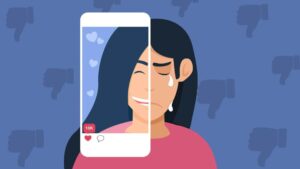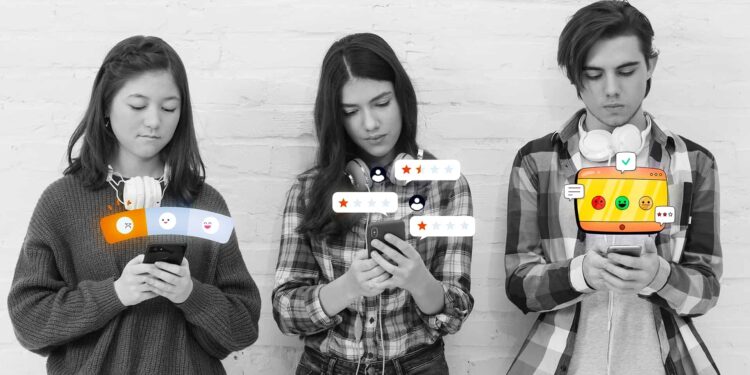Social media and low self-esteem issues are one of the side impacts of the modern digital environment where people are connected and open to broader mediums. Because it allows people to interact with friends, family, and communities worldwide, social media has become an essential part of our lives. Not only the connectivity but social media platforms are widely used for businesses and entrepreneurship.
Even if it unites us, it also exposes us to a never-ending supply of relevant photos, success stories, and apparently ideal lives. This constant comparison can negatively impact many people’s self-esteem by encouraging feelings of shortfall and self-doubt. The impact of social media on society has been revolutionizing, however, with positive comes negative too.
The highlights of other people frequently cause users to doubt their own value, which can lead to a vicious cycle of low self-esteem that can be difficult to escape.
Social media has changed the way we communicate, connect, and perceive the world. However, it’s simple to believe that everyone else has it all sorted out as we scroll through feeds full of expertly chosen photos, success stories, and perfect” experiences. Social media and self-worth honestly exist when people’s self-esteem might be eroded by this continual exposure to romanticized depictions of other people’s lives, making us feel inferior or even undeserving in contrast.
Therefore, Because of the nature of what we see online, Social media and self-esteem are linked. A distorted view of reality results from people sharing their successes rather than their setbacks. We witness romances, trips, promotions, and accomplishments, but we hardly ever witness the difficulties, difficult days, or insecurities that lie behind them. This selective sharing results in low self-esteem issues, comparing ourselves to people we believe are performing better, which frequently makes us feel less worthwhile or confident.

But, little did people know; who shares their bad days or bad sides?
Certainly, no one likes to!
Furthermore, in the impact of social media on society, the chase of likes and encouraging remarks, which can seem affirming but are ultimately temporary, is another reason. This reliance on outside approval can eventually weaken our internal feeling of value, making us feel nervous or self-conscious when we don’t get the same amount of attention as other people. In the social media and self-worth cycle, Many people get into this loop, which makes them compare, feel insufficient, and look for online approval to make up for it.
Social media can destabilize our self-esteem, but it doesn’t have to take over. By identifying these trends, making an effort to control our consumption, and concentrating on offline self-affirming activities, we can escape the pitfalls that undermine our self-esteem and reclaim a more positive, healthy self-image.
Nevertheless, understanding low self-esteem is also important here. People with low self-esteem have a generally unfavorable opinion of themselves and question their skills, value, and worth. People who have poor self-esteem frequently compare themselves negatively to others and might feel inadequate, unworthy, or unable. Numerous aspects of life, including relationships, professional decisions, and mental and physical health, can be impacted by this lack of confidence.
The Social media and self-esteem loop can male people to Self-doubt, avoid problems, or have unreasonably high expectations, internal criticism, negative self-talk, Dependency on other people’s affirmation, trouble voicing needs, establishing limits, or defending themselves.
Social media and low self-esteem: Comparison is the killer of joy

Although a small amount of comparison can occasionally spur us on or encourage constructive change, it frequently causes more harm than good. Comparison can be a significant “killer of joy” a term that summarizes how constant comparison deprives us of happiness, misrepresents our perception, and weakens our feeling of value.
In the impact of social media on society, we frequently see an incomplete picture when we compare ourselves against others. The majority of people tend to minimize or completely hide their difficulties, fears, and failures while emphasizing their greatest moments and accomplishments.
This gives the impression that other people have the “perfect” being, making us feel left out regardless of our own achievements or advancements. Then, we ignore what we already have and concentrate on what we lack, leading to low self-esteem. Regardless of how well we may be doing, this tendency to compare our behind-the-scenes experiences to someone else’s highlight reel can leave us feeling insufficient, undeserving, or even stuck.
This never-ending cycle of comparison can lead to low self-esteem and delay our development. It’s true to lose sight of our own special strengths, objectives, and ideals when we’re too preoccupied with comparing ourselves to others.
Moreover, comparing can give the impression that satisfaction, achievement, and happiness are scarce. However, we can recognize others’ victories as distinct journeys that are unrelated to our own, rather than viewing them as something that deprives us.
Being grateful and self-aware is the first step in ending the comparing loop in Social media and self-esteem. We can better appreciate our individual paths if we take the time to concentrate on our accomplishments, no matter how minor. By cultivating appreciation for what we currently have, we can change our attention from what we lack to what we value and enjoy as an impact of social media on society.
Highlight Reel Effect: Why Social Media Shows One Part of the Story

One main factor in Social media and self-esteem loops is the Highlight Reel Effect.
By their very nature, social networking sites encourage users to highlight the most beautiful and exciting parts of their lives, frequently neglecting the hardships, disappointments, and uninteresting aspects of everyday life. This phenomenon, which is frequently referred to as the “highlight reel effect,” misrepresents and idealizes a person’s life by showing only a portion of their actual circumstances.
There is a social media vs. reality game and People hardly ever tell the whole story, including the difficulties, fears, or ordinary moments that aren’t highlighted. Not only does the highlight reel effect affect individuals, but it also contributes to a cultural shift in which visual storytelling is becoming more and more important for communication.
This change in Social media and self-esteem has the potential to twist how we view normality, making difficulties or flaws seem like individual shortcomings rather than common human experiences. Constantly seeing other people’s greatest moments might cause us to doubt our own worth, beauty, and progress, which can worsen low self-esteem.
Nevertheless, separating reality from delusion can be facilitated by realizing that social media is a selective display. We might take social media posts at face value instead of allowing them to impact our feeling of self-worth when we remind ourselves that everyone faces difficulties behind the scenes.
Achievable Actions to Reserve Your Social Media Self-Esteem

In Social media and self-esteem, it’s wise to take positive measures to protect our low self-esteem in a world where social media dominates our everyday interactions and shapes our opinions. The following useful techniques will assist you in using social media with awareness and preserving a positive feeling of self-worth:
Spend Less Time on Social Media
Cutting back on your social media usage is one of the best strategies to work for low self-esteem. Establish daily usage time limits or declare some periods of the day to be “social media-free.” By doing this, you can resist the need to browse endlessly and concentrate on the things that truly make you happy and fulfilled.
Manage Your Feed
Be thoughtful about the stuff you consume and the people you follow. If an account makes you feel inadequate or evokes unpleasant feelings, unfollow it. Rather, look for accounts that motivate, encourage, and inspire you. Be in the company of positive people who support a positive outlook and affirm your value as a person.
Develop an attitude of gratitude
You can change your perspective from what you lack to what you have by developing an attitude of thankfulness. Spend some time every day thinking about your joys, your talents, and your accomplishments. Instead of comparing your journey to others, you can learn to enjoy your own by sharing these experiences with friends or recording them in a notebook.
Join in Mindfully
Be careful when engaging with others on social media. Consider how a post makes you feel for a second before responding to it. It would be wise to take a step back and rest if you start to feel irritated or jealous. Instead of becoming engaged in negativity, have real and authentic conversations.
Pay Attention to Real-Life Relationships
Even while social media helps keep us in touch, in-person relationships with friends and family should always come first. Build supportive relationships offline, spend time with loved ones, and participate in activities that promote genuine connections. These connections can boost your confidence and provide you a more realistic picture of your value.
Learn the basics of social media literacy
Gaining knowledge about social media’s workings will help you use it more skillfully. You can examine content more objectively and with less emotional attachment if you realize that many social media posts are intended to show one side.
Nonetheless, you can succeed in the digital world without compromising your feeling of self-worth by creating a pleasant atmosphere for yourself. Remember, that you are not alone in navigating the complexity of social media and low self-esteem.













